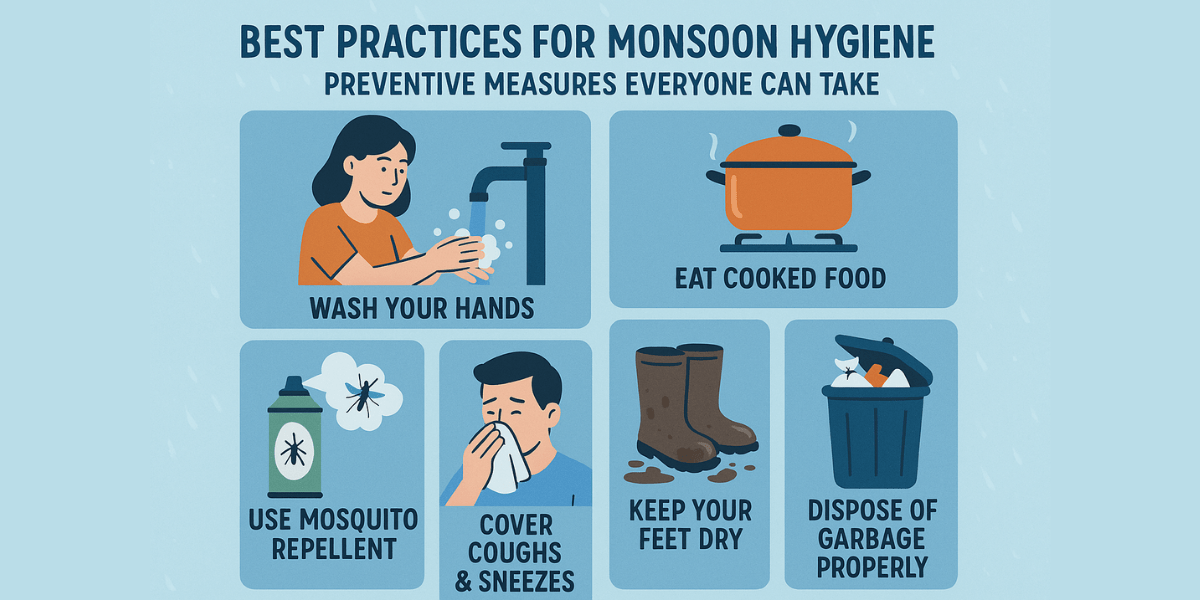
Best Practices for Monsoon Hygiene: Preventive Measures Everyone Can Take
The monsoon season is often welcomed as a time of relief after months of summer heat. However, while rain brings freshness to the environment, it also increases the risk of several health problems. Stagnant water, high humidity, and poor sanitation during this period create the perfect breeding ground for bacteria, viruses, and mosquitoes. This is why maintaining monsoon health and hygiene becomes critically important. By following the right monsoon hygiene tips, families can protect themselves from seasonal illnesses and strengthen community health.
Why Monsoon Hygiene Matters
The rainy season contributes to a sharp rise in waterborne and mosquito-borne infections such as dengue, malaria, typhoid, hepatitis A, and gastroenteritis. These diseases spread quickly in urban environments, particularly in crowded areas where sanitation is compromised. Practicing best practices for monsoon hygiene not only keeps individuals safe but also prevents outbreaks that can overwhelm hospitals and clinics.
Common Hygiene Risks During Rainy Season

During the monsoon, several factors increase the chances of infection:
-
Stagnant water – Acts as a breeding ground for mosquitoes.
-
Contaminated water supply – Causes cholera, hepatitis, and diarrhea.
-
Spoiled food – Humidity accelerates food spoilage, leading to stomach infections.
-
Poor hand hygiene – Increases the spread of viral and bacterial illnesses.
Understanding these risks helps families adopt stronger monsoon preventive measures to avoid falling ill.
Monsoon Hygiene Tips for Individuals and Families
Adopting good hygiene practices is the simplest and most effective way to safeguard health during the rainy season. Here are some practical monsoon hygiene tips:
-
Drink safe water – Always boil water or use reliable filters to prevent waterborne infections.
-
Eat freshly cooked food – Avoid roadside vendors and ensure meals are prepared hygienically at home.
-
Wash hands frequently – Use soap or hand sanitizers, especially before meals.
-
Keep surroundings clean – Eliminate stagnant water from flowerpots, rooftops, and drains.
-
Wear protective clothing – Use full-sleeved clothes and mosquito repellents to avoid bites.
-
Dispose waste properly – Garbage piles attract flies and worsen sanitation conditions.
By making these practices part of daily life, individuals can significantly reduce the risk of monsoon diseases.
Best Practices for Monsoon Hygiene in Communities
While personal hygiene is vital, community-level efforts are equally important. Municipal authorities and neighborhoods can work together to improve monsoon health and hygiene by:
-
Regularly cleaning drainage systems to prevent waterlogging.
-
Spraying insecticides in areas with high mosquito breeding.
-
Educating the public on food safety and water purification.
-
Ensuring garbage is collected and disposed of properly.
-
Encouraging vaccinations against typhoid, hepatitis, and influenza.
These collective measures help reduce the overall disease burden during the rainy season.
Preventive Measures Everyone Can Take
Aside from hygiene, other monsoon preventive measures can further strengthen health protection:
-
Boost immunity – Eat fruits, vegetables, and supplements rich in vitamin C and zinc.
-
Stay dry – Change out of wet clothes quickly to avoid fungal and skin infections.
-
Strengthen home safety – Keep first-aid kits, mosquito repellents, and essential medicines ready.
-
Seek medical help early – Don’t ignore persistent fever, vomiting, or diarrhea.
Taking these steps ensures families are well-prepared for seasonal health challenges.
Role of Pharmacies in Promoting Monsoon Hygiene
Pharmacies are often the first point of contact for families during seasonal illnesses. In times when hospitals may be overcrowded, access to reliable pharmacies ensures that people can quickly get medicines, water purification tablets, oral rehydration salts, and mosquito repellents.
The top-rated pharmacy in Karachi, Dawa Healthcare Pharmacy, has consistently provided safe and affordable healthcare solutions during the rainy season. Known as an affordable pharmacy in Karachi, Dawa Healthcare makes preventive products and essential medicines accessible to all communities. Their commitment to health awareness campaigns and authentic medicine supply helps families stay protected during monsoon outbreaks.
By guiding customers on proper hygiene practices and ensuring the availability of life-saving medicines, pharmacies play an essential role in minimizing seasonal health risks.
Conclusion
The monsoon season should be a time of joy and rejuvenation, not one of illness and worry. By following monsoon hygiene tips and practicing best practices for monsoon hygiene, individuals and communities can drastically reduce the spread of infections. Families must take simple steps such as drinking safe water, eating hygienic food, and protecting against mosquitoes to safeguard their health.
Trusted healthcare providers also play a vital role. Dawa Healthcare and Dawa Healthcare Pharmacy, recognized as the top-rated pharmacy in Karachi and an affordable pharmacy in Karachi, continue to support communities with authentic medicines, preventive products, and expert guidance.
With awareness, preparation, and reliable healthcare support, everyone can enjoy the rainy season while staying safe from illness. Practicing monsoon health and hygiene is not just a seasonal precaution, it is a long term investment in public health.

